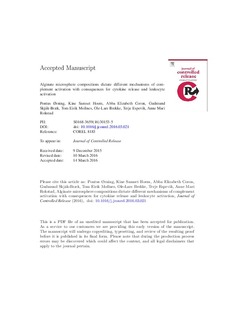Alginate microsphere compositions dictate different mechanisms of complement activation with consequences for cytokine release and leukocyte activation
Ørning, Mathias Pontus; Hoem, Kine Samseth; Coron, Abba Elizabeth; Skjåk-Bræk, Gudmund; Mollnes, Tom Eirik; Brekke, Ole Lars; Espevik, Terje; Rokstad, Anne Mari
Journal article, Peer reviewed
Permanent lenke
http://hdl.handle.net/11250/2413839Utgivelsesdato
2016Metadata
Vis full innførselSamlinger
Sammendrag
The inflammatory potential of 12 types of alginate-based microspheres was assessed in a human whole blood model. The inflammatory potential could be categorized from low to high based on the four main alginate microsphere types; alginate microbeads, liquefied core poly-l-ornithine (PLO)-containing microcapsules, liquefied core poly-l-lysine (PLL)-containing microcapsules, and solid core PLL-containing microcapsules. No complement or inflammatory cytokine activation was detected for the Ca/Ba alginate microbeads. Liquefied core PLO- and PLL-containing microcapsules induced significant fluid phase complement activation (TCC), but with low complement surface deposition (anti-C3c), and a low proinflammatory cytokine secretion, with exception of an elevated MCP-1(CCL2) secretion. The solid core PLL-containing microcapsules generated lower TCC but a marked complement surface deposition and significant induction of the proinflammatory cytokines interleukin (IL-1)β, TNF, IL-6, the chemokines IL-8 (CXCL8), and MIP-1α (CCL3) and MCP-1(CCL2). Inhibition with compstatin (C3 inhibitor) completely abolished complement surface deposition, leukocyte adhesion and the proinflammatory cytokines. The C5 inhibitions partly lead to a reduction of the proinflammatory cytokines. The leukocyte adhesion was abolished by inhibitory antibodies against CD18 and partly reduced by CD11b, but not by CD11c. Anti-CD18 significantly reduced the (IL-1)β, TNF, IL-6 and MIP-1α and anti-CD11b significantly reduced the IL-6 and VEGF secretion. MCP-1 was strongly activated by anti-CD18 and anti-CD11b. In conclusion the initial proinflammatory cytokine responses are driven by the microspheres potential to trigger complement C3 (C3b/iC3b) deposition, leukocyte activation and binding through complement receptor CR3 (CD11b/CD18). MCP-1 is one exception dependent on the fluid phase complement activation mediated through CR3.
